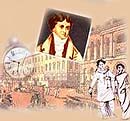 |
| a home away from home |
| HOME FEEDBACK TELL A FRIEND WEB SITE DESIGN CAREER WITH US CONTACT US |

Reform
and Education: Young Bengal & Derozio
Nineteenth century
Calcutta witnessed the growth of western education, development of modern
Bangla prose, attempts to make social reforms and some initiatives for
the welfare of the women. All these are regarded as 'renaissance' in one
word. It had a multifaceted character. In fact
the Calcuttans responded
differently to the British rule. Some regarded it as a shameful incident,
which should be protested whereas some thought that Calcutta
would be benefited by the British rule, as that would pave way for the
spread of western education.
The impact of British rule and modern western culture was felt first in
Bengal in general and Calcutta in particular. That awakening is known
as the Bengal Renaissance. For about a century, Calcutta's conscious awareness
of the changing modern world was more developed than other parts of the
country.
Under the impact of the western contact the life of Calcutta experienced a radical change. The establishment of Hindu College (today's Presidency College) in 1817 further accelerated the change. The education imparted at the Hindu College generated a feeling for the radicalism among the students. In this respect the name of
Henry Louis Vivian Derozio, a teacher of the College stands out pre-eminently. Derozio was born in Calcutta in 1809. Henry Louis Vivian Derozio (1809 - 1831) was the person who preached in favour of the twin gods of reason and liberty. He opposed all the superstitions prevailing in the society. His followers were known as the Young Bengal.
Following the way of the Atmiya Sabha of Rammohan Roy, two other organizations were established by the Young Bengal. Those were the Academic Association (1828/1829) and the Society for the Acquisition of General Knowledge [S.A.G.K] (1838), which were established in the twenties and in the thirties of the 19th century. One of the main aims of these two associations was to evaluate many social rituals and customs through logical interpretation. Derozio had asked his disciples to judge their duty and righteousness on the basis of their own intellect, logic, sense and conscience. They should not follow anything as the words of the priest/clergy (Gurubachan), or the words of god (Daivabachan) or the scripture (Shastrabachan). They were influenced by the empirical ideas of rational enquiry, as interpreted by philosophers like Bacon, Thomas Paine, Locke and others.
The scientific bent of the Derozian mind was reflected in their profound belief in the freedom of thought and expression. The disciples of Derozio were truly fearless.
GREAT INDIANS || BENGALI SECTION || BENGALI MARRIAGE || BABY'S NAME || WALLPAPER || BENGAL || WEATHER || TRAVEL
MOBILE WALLPAPER || E-CARD || MOVIE || WEBSITE LINKS || ASSOCIATIONS || SHOPPING || ASTROLOGY || MUSIC || BEAUTY CARE
TIGER || NEWS || GUEST CORNER || FEEDBACK || LINK TO US || FOR ADVERTISING || SERVICES || CONTACT || BENGALI CALENDAR
Graphics, Sound or content copied or produced in part or whole in any media will be illegal.
Persons or websites caught using our material will be penalized.
Privacy Statement || Copyright
Copyright ©1999-2014 BANGALINET.COM